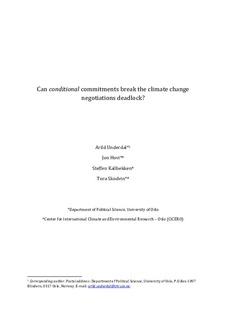| dc.contributor.author | Underdal, Arild | |
| dc.contributor.author | Hovi, Jon | |
| dc.contributor.author | Kallbekken, Steffen | |
| dc.contributor.author | Skodvin, Tora | |
| dc.date.accessioned | 2018-01-15T16:12:47Z | |
| dc.date.available | 2018-01-15T16:12:47Z | |
| dc.date.created | 2011-10-21T14:29:47Z | |
| dc.date.issued | 2012 | |
| dc.identifier.citation | International Political Science Review. 2012, 33 (4), 475-493. | |
| dc.identifier.issn | 0192-5121 | |
| dc.identifier.uri | http://hdl.handle.net/11250/2477652 | |
| dc.description.abstract | Can a conditional commitment by a major actor (for example, the European Union) induce other major actors (such as the USA, China, India, or Japan) to do more to mitigate global climate change? We analyse this question by first estimating the impact of emission reductions by one of these actors on the mitigation costs of the others and, second, by exploring how domestic politics influence the willingness of the European Union and the USA to contribute. We find that an emission cut by any actor will reduce mitigation costs for all the others and thereby expand the settlement range. These cost reductions seem, however, insufficient to induce significant unilateral policy change. Emissions trading can cut aggregate costs further, but also redistribute wealth. Domestic politics tend to add weight to the concerns of powerful actors that stand to lose from more ambitious mitigation policies. | |
| dc.language.iso | eng | |
| dc.title | Can conditional commitments break the climate change negotiations deadlock? | |
| dc.type | Peer reviewed | |
| dc.type | Journal article | |
| dc.description.version | submittedVersion | |
| dc.source.pagenumber | 475-493 | |
| dc.source.volume | 33 | |
| dc.source.journal | International Political Science Review | |
| dc.source.issue | 4 | |
| dc.identifier.doi | 10.1177/0192512111432564 | |
| dc.identifier.cristin | 847045 | |
| dc.relation.project | Norges forskningsråd: 209701 | |
| cristin.unitcode | 7475,0,0,0 | |
| cristin.unitname | CICERO Senter for klimaforskning | |
| cristin.ispublished | true | |
| cristin.fulltext | preprint | |
| cristin.qualitycode | 2 | |
